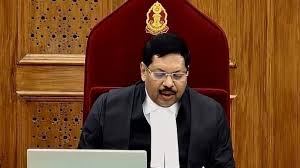
CJI Gavai Rebukes Government Over Tribunal Reforms Act Adjournment Plea
Attorney General’s repeated requests for delay spark sharp remarks from Chief Justice
Supreme Court stresses urgency in deciding Tribunal Reforms Act before CJI’s retirement
By Our Legal Reporter
New Delhi: November 07, 2025 — The Supreme Court of India witnessed a heated exchange this week when Chief Justice of India (CJI) B.R. Gavai questioned the government’s repeated attempts to delay hearings on the Tribunal Reforms Act. The case, challenging the validity of uniform four-year tenures for tribunal members, has become a flashpoint between the judiciary and the executive.
Also Read: How Indians Can Start a Company in the USA: Step-by-Step Guide
The CJI’s pointed remark — “Why don’t you seek adjournment till I retire?” — was directed at Attorney General (AG) R. Venkataramani, who again sought a postponement. The comment reflects growing frustration within the judiciary over what appears to be deliberate stalling tactics ahead of Justice Gavai’s retirement on November 23.
Background of the Case
- The Tribunal Reforms Act, 2021, sets a uniform four-year tenure for tribunal members and chairpersons.
- This contradicts earlier Supreme Court rulings that mandated at least a five-year term to ensure independence and consistency.
- Petitioners argue that the Act violates constitutional principles and undermines tribunal autonomy.
Also Read: Directors Remain Personally Liable for Cheque Bounce Cases Despite IBC Debt Settlement
Government’s Requests for Adjournment
The Attorney General, representing the Union Government, has repeatedly sought adjournments citing scheduling conflicts. On November 3, the Centre even filed a midnight plea to refer the case to a larger bench — a move the Court rejected as an attempt to delay proceedings.
Despite prior concessions, another adjournment was requested on November 6, prompting CJI Gavai’s sharp rebuke. He reminded the AG that the Court had already accommodated two delays, emphasizing fairness and efficiency.
CJI’s Response
The Chief Justice stated that the AG was “not being fair to the court,” noting that the bench needed adequate time to write the judgment before his retirement. He added, “If you want the hearing after November 24, when Justice Surya Kant takes over as CJI, you should say it openly.”
Judicial Concerns
- The Court has long opposed executive interference in tribunal appointments and tenure.
- Shorter tenures, the bench noted, may weaken independence and deter experienced professionals.
- Repeated adjournments risk eroding public confidence in the justice system.
Broader Implications
This confrontation underscores the ongoing struggle between the judiciary and executive over the balance of power. Legal analysts suggest that the final ruling could reshape how tribunals function in India.
- If the Court strikes down the four-year rule, it will reaffirm judicial authority over tribunal structures.
- If upheld, it could grant the government greater control over appointments and tenure policy.
What Happens Next
The case is now adjourned to November 10. However, the bench remains determined to deliver its verdict before November 23. Justice Surya Kant will take charge as CJI thereafter.
Reactions from Legal Community
- Senior advocates criticized the government’s repeated adjournment pleas as disrespectful to judicial time.
- Former judges recalled similar past clashes over tribunal independence.
- Experts stress that the Court’s stance reinforces its role as a guardian of constitutional fairness.
Conclusion
The exchange between CJI Gavai and AG Venkataramani symbolizes the judiciary’s determination to uphold independence in the face of executive pressure. As the CJI’s retirement approaches, all eyes remain on how swiftly the Supreme Court will deliver this crucial judgment on the Tribunal Reforms Act.
Key Takeaways
- CJI Gavai rebukes repeated government adjournment pleas.
- Supreme Court aims to rule before November 23 retirement deadline.
- Judgment could redefine tribunal independence in India.
Also Read: Supreme Court Orders Full Disclosure of Convictions: Non-Disclosure Will Lead to Disqualification